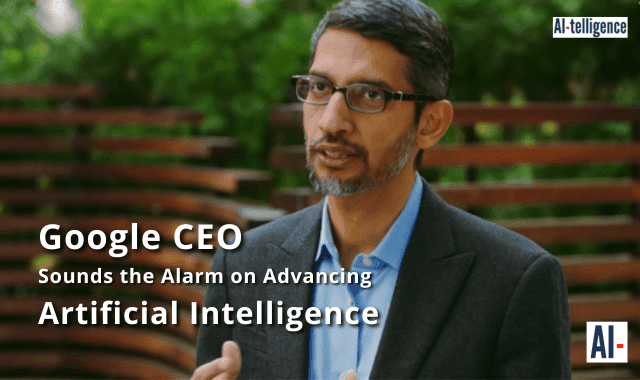Google CEO Sundar Pichai Sounds the Alarm on Advancing Artificial Intelligence
 Google CEO Alarmed on Artificial Intelligence |
During a recent interview with CBS' "60 Minutes," Sundar Pichai, CEO of Google and Alphabet, expressed concern about the rapid development of artificial intelligence (AI).
Google Sounds Alarmed on Artificial Intelligence
Pichai warned that every product of every company will be impacted by AI and urged society to prepare for this disruptive technology.
We ought to adapt as a society for it, Pichai told Pelley, adding that pursuing AI will destroy jobs that depend on experts, including writers, accountants, architects, urban planners, and, ironically, even software engineers.
He stressed that the impact of AI would be significant and would affect every product across all sectors.
Journalist Scott Pelley tried out various Google AI products during the interview, including a chatbot named Bard that displayed human-like capabilities, leaving Pelley feeling "unsettled" and "speechless."
Pelley also witnessed robots in action, such as those at DeepMind that played soccer and learned on their own without human intervention.
Pichai highlighted the issue of disinformation and warned that the scale of the problem with fake news and images would be much more significant with AI and could cause harm.
He also predicted that radiologists could have AI collaborators within the next five to ten years that would prioritize the most serious cases for them.
Overall, Pichai's interview emphasized the need for society to adapt to the changes that AI will bring and to prepare for a future where AI will be an integral part of every industry and product.
Google CEO Urges Caution with Artificial Intelligence
Sundar Pichai, CEO of Google and Alphabet, has expressed concern about the rapid progress of artificial intelligence (AI) and its potential consequences.
In a recent internal meeting with Google employees, Pichai stated that the success of the newly launched AI chatbot, Bard, is dependent on public testing and that "things will go wrong."
The launch of Google's AI chatbot, Bard, last month was followed by Microsoft's announcement in January that it would include OpenAI's GPT technology in its search engine Bing.
However, concerns about the potential consequences of this rapid progress in AI have been raised by the public and critics in recent weeks.
In March, more than 25,000 people signed a letter calling for an immediate pause in training "experiments" related to large language models that were more powerful than OpenAI's flagship LLM, GPT-4.
The letter was signed by tech industry figures such as Elon Musk and Steve Wozniak, as well as dozens of academics.
During this interview with CBS' "60 Minutes," Pichai stressed the need for society to quickly adapt to AI regulations, laws to punish abuse, and treaties among nations to make AI safe for the world.
He also emphasized that the development of AI should involve not just engineers but also social scientists, ethicists, philosophers, and others to ensure that the technology aligns with human values, including morality.
Despite acknowledging that there may be a mismatch between the pace of technological evolution and the pace at which society can think and adapt as institutional structures, Pichai expressed optimism because more people are starting to worry about the implications of AI early on compared to other technologies in the past.

.png)
Comments
Post a Comment